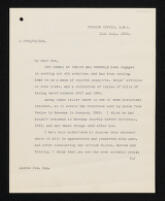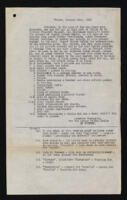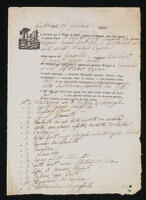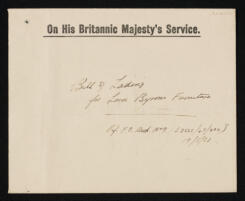Letters dated
28 Nov. 1912
29 Jan. 1913
22 Apr. 1913
11 Feb. 1914
8 Mar. 1914
25 Feb. 1916
30 Oct. 1916
Letters dated
11 Feb. 1920
15 Feb. 1920
29 Mar. 1920
7 Jan. 1922
22 Feb. 1922
20 June 1922
One of 48 notebooks, Add.MS.c.113-150, used for Powell's edition of Thucydides published in 1942. Collation of Utrecht Gr. 13. With a typescript note from A. S. F. Gow to Powell dated 9 June 1935, two typescript drafts of "A lost manuscript of Cicero", one of them corrected, and one sheet of notes laid in loose.
Sem títuloForeign Office, S.W.1.—Presents to Trinity College a bill of lading for the shipping of Lord Byron’s furniture, discovered among the archives of the British Consul at Venice.
—————
Transcript
FOREIGN OFFICE, S.W.1.
21st July, 1932.
L 3720/43/402.
My dear Gow,
Our Consul at Venice has recently been engaged in sorting out old archives, and has been sending home to us a mass of expired passports, ships’ articles or crew lists, and a collection of copies of Bills of Lading dated between 1817 and 1823.
Among these latter there is one of some historical interest, as it covers the furniture sent by Byron from Venice to Ravenna in January, 1820. I think he had himself returned to Ravenna shortly before Christmas, 1819, and had these things sent after him.
I have been authorised to dispose this document where it will be appreciated and preserved with care, and after considering the British Museum, Harrow and Trinity, I think that you are the most suitable people to {1} have it, if you want it.
I enclose a translation of it so that you may see its nature {3}. I think the last item the “small child’s bed” is rather pathetic as it doubtless belonged to little Allegra, who had been ill just before they left Venice.
I do not know whether you will find it necessary to consult anybody else before accepting this offer. I presume your Council does not meet in the long vacation, nor your Library Committee, but you can doubtless speak to the Master or Vice-Master about it, and if you tell me that you would like it, I will send it by registered post or bring it with me some week-end when I come to Cambridge.
Yours ever,
Stephen Gaselee
Andrew Gow, Esq. {2}
I feel that if it went to Harrow it might set the boys asking “But why did the poet go from Venice to Ravenna?”
—————
Typed, except the signature and the postscript.
{1} Typed as a catchword at the foot of the first page and repeated at the beginning of the next.
{2} Typed at the foot of the first page.
{3} It is unclear whether the translation accompanied the bill from Venice, or whether it was made in England by Gaselee himself or someone else.
Typed pages containing Gow's notes and [Laurence's?] corrections. Accompanied by a typescript letter from Gow to Philip Gaskell [Librarian of Trinity College Library] dated 16 June 1968 and an undated four page letter from Peter [F. L. Lucas] to Gow about the poems at the back.
Sem título(It is unclear whether this accompanied the bill of lading from Venice, or whether it was made in England by Gaselee himself or someone else.)
—————
Transcript
Venice, January 26th, 1820.
Embarked, in the name of God and under good auspices, one {1} and for all in this port of Venice by Mr. Richard Belgrave Hoppner, His Britannic Majesty’s Consul for account of Signor Milord Bajron, in the hold of the sailing ship named Divina Provvidenza, owner Francesco Ceolin, Austrian, to convey and consign in this present voyage, to the said Signor Milord Bajron the undermentioned and numbered goods, dry, entire, and well conditioned and of the numbers stated: and so the said Master promises to consign them on his safe arrival; and as freight there shall be paid to him in all eighteen Roman crowns, Crowns 18, and in proof thereof this, together with other similar (copies) shall be signed by the said Master, and if he shall be unable to write, a third person shall write for him, and only drawn up, the others being of no value.
No. 4 Mattresses, with 3 pillows and bolster.
” 1 Small padded bed cover.
(a) 2 Empty mattress cases.
(b) 4 Comodes—packed in matting
2 Footstools
1 Basket with various effects, covered in cloth.
1 Valise.
1 Bundle containing a bracket and other effects packed in matting.
1 Dining-room table.
1 Small table.
1 Filter.
4 Cases of printed books.
1 Case containing a plaster Statue.
(c) 1 Sofa of cherry wood.
4 Cushions for the above.
(d) 16 Small walnut chairs.
6 Small straw-seated arm chairs.
1 Caldron containing various effects.
2 Small wooden dog-kennels.
1 Bath tub.
(e) 1 Package containing a double bed and a small child’s bed, taken to pieces.
Lodovico Barbaglia,
for the Master Franco Ceolin as witness.
Notes:—
(a). It was usual at that time to stuff mattress cases with straw—hence the word “Pagliazzo”—(paglia—straw)—presumably the servants’ mattresses.
(b). Como stiorati—the latter word is probably derived from stiora or mat, and possibly they were cov-ered in matting. “Stiorati” a term which is used locally for “inlaid”.
(c). Sofa di Cevesar—this word is evidently Cereser—or the local dialect for cherrywood.
(d). “Careghe”, diminutive “Careghino”—Venetian for a chair.
(e). “Cocchietta”—mispelt† for “cocetta”—double bed. “Putello”—Venetian for child.
—————
1 single sheet.
{1} A slip for ‘once’?
{2} ‘aj’ possibly typed over other letters.
† Sic.
Venice.—Certifies that R. B. Hoppner, the British Consul, has embarked, on Lord Byron’s account, certain goods aboard the Divina Providenza, bound for Ravenna.
(The envelope bears the printed words ‘On His Britannic Majesty’s Service’, and is labelled ‘Bill of Lading | for Lord Byrons Furniture | Ref. F.O. Desp. No 9. (L2523/43/402) | 19/5/32.’ This is presumably the envelope in which the bill was sent from Venice.)
Newnham College, Cambridge.—Thanks him for a copy of the list of his writings.
—————
Transcript
Newnham College, Cambridge
17 December 1945
Dear Dr Greg
How very pleasant to hear from you again and to have this breath-taking list of your writings. It seems almost impossible that one person could have produced so much learned work. I am ashamed to say that I did not know you flirted with economics now and then.
I have been thinking of you lately because of a reference in Gow’s Letters from Cambridge. It seems that they have—very properly, as he says—made you an Honorary Fellow. I like to think of you in that Library, as I do whenever I go there. Much more suitable than the old W.T.I.D. {1} environment!
I always find it difficult to understand how anyone who has lived in Cambridge can bear London—or indeed anyone else. I love my life here, though I admit it is a very broken one, and includes many journeyings up and down to Committees. I gather from the address on your envelope, which I am using, that you have given up Wimbledon and returned to Sussex. I hope all the family is well and flourishing. All good wishes for Christmas, New Year
Yours sincerely
Myra Curtis
—————
{1} The War Trade Intelligence Department, for which both correspondents worked during the First World War.
(The review is headed, ‘Poet and Scholar. The Last of the Shropshire Lad’.)
9 letters from various people making suggestions of portrait artists to be used in making portraits of Trinity Fellows under of the scheme funded by the Memorials Committee. The letters are from P. & D. Colnaghi & Co., W. R. M. Lamb, Henry M. Hake, A. M. Hind, C. J. Holmes, Henry Tonks, Edward Maufe, David, the Earl of Crawford and Balcarres, and W. J. W. B. Artists discussed include G. L. Brockhurst, Francis Dodd, Paul Drury, Eric Gill, R. Gleadowe, Eric Kennington, Winifrede Knight, Henry Lamb, W. Rothenstein, F. E. Jackson, A. K. Lawrence, T. W. Monnington, Randolph Schwabe, and Leon Underwood. Accompanied by two sheets of notes.
Sem títuloLetters dated
21 May 1923
17 Oct. 1923
21 Oct. 1923
14 Dec. 1923
9 Jan. 1924
A candid photograph of Gow sitting in a folding chair with a coat and scarf reading a book.
Sem títuloLetters dated
26 Mar. 1925
27 June 1925
30 Nov. 1925
18-19 Mar. 1926
4 June 1926
20 Jan. 1927
20 Jan. 1928
28 Jan. 1928
8 Feb. 1928
5 Mar. 1928
26 May 1928
27 July 1928
14 Dec. 1928
3 Mar. 1929
5 Mar. 1929
Three letters.
Eight letters which include his frank discussion of his own disappointment in the portrait of Parry and his desire to replace it with another.
W. H. Salter's manuscript reminiscence headed "Housman and Mrs Verrall's Automatic Writing" and a letter from A. S. F. Gow concerning this and the papers of A W Verrall.
Department of Latin, University College, London.—Seeks his support for the publication of a collected edition of A. E. Housman’s articles.
—————
Transcript
University College London, Gower Street, WC1
Department of Latin
15th December, 1960.
Dear Mr. Symons,
You may remember that in my Memorial speech on AEH I expressed the hope that his explicit wish that his writings should not be collected would one day be set aside. The reasons for your uncle’s wish are stated by Mr Gow, and by providing an index to the articles he admits that it runs counter to the needs of scholarship. The index, however, is not a satisfactory substitute. All over the world scholars need these writings, and only in a few places are the journals containing them available. The copyright of the articles is considered to be vested in the editors, and a preliminary enquiry with the editors of the Classical Review and the Classical Quarterly has brought the reply that they would not only permit but positively welcome the publication of the articles. When journals cease to exist, as e.g. the Classical Journal has done, the copyright, I believe, returns to the heirs. I am therefore writing to you to ask what your own views are, and whom, apart from you, I should approach.
I may say that this is merely exploratory. No editorial committee has been formed, and I myself may in the end not be associated with the venture at all. But because of my speech I seem to have become for the moment the centre at which the voices of those who want and need this publication are gathered, and I have therefore decided that it is for me to put before you and whomever you suggest our point of view. It is that scholarship needs these writings; that they are so distinguished also in their style that they should not be withheld; and that the reasons for your uncle’s wish are not valid. No scholars wants to be judged in the light of his earlier publications. Nevertheless the writings of great scholars are generally collected, and every person whose judgement is worth while understands that the author in his maturity would not have approved everything he had ever written. Perhaps the special circumstances in this case could be stated in a dignified manner either in an English preface or in a prefatory Latin poem.
I should be most grateful for an expression of your views.
Yours sincerely,
O. Skutsch.
N. V. H. Symons, Esq.,
Lymington, Hants.
—————
Typed, except the signature and a correction.
Letter from Housman, undated but likely 1926 accepting the invitation to sit for a portrait, and five letters from R. Gleadowe discussing arrangements to provide drawings and to draw a portrait of Housman.
Trinity College, Cambridge.—Thanks him for a copy of The Shakespeare First Folio.
Letter from Innes agreeing to sit for F. Ernest Jackson, and five letters from Jackson about the portrait.
Trinity College, Cambridge.—Praises The Shakespeare First Folio.
Two letters from Glaisher and five letters from Francis Dodd about the portrait. In the letter dated 19 Aug. 1926, Glaisher shares his memories of William Davidson Niven. In the letter of 1 Aug. 1926 Dodd declines to make another drawing of A. E. Housman, as he has found that he rarely repeated success with a subject.
One letter from Hopkins and two from Kennington.
Two letters from William Nicholson and from J. J. Thomson relating to the varnishing of the Thomson portrait. Thomson's letter also includes remarks on Sir William Davidson Niven.
Two letters from A. M. Hind advising on the use of Celastoid and one letter from the restorer J. R. England sending a sheet.
26 Carlyle Square, London, SW3.—Suggests dividing the A. E. Housman letters in his possession between University College, London, and Trinity College, Cambridge.
(A note of Symons’ reply indicates his approval of the suggestion.)
—————
Transcript
26 Carlyle Square, London, SW3
19th January 1961
Dear Symons
The Housman Letters.
I have little doubt that Trinity, Cambridge, would accept them if they were offered, and so I daresay for the matter of that would St. John’s College, Oxford: even the stuffiest of librarians would not look this gift horse in the mouth. I was more concerned with the question which institution has best de-served the offer by showing some signs of interest, if not enthusiasm, in the past. Gow has always been rather crusty and uncooperative in these matters, and Trinity library has never made any attempt to improve its representation of AEH’s published works. It is true that the letters to Mrs Symons date from the Cambridge period, but those to his step-mother are all much earlier; so that if the balance of appropriateness of site is evenly divided my own feeling was that the decision should come down in favour of the institution that had done something to deserve the gift. A possible alternative, of course, would be to give Trinity the letters to your mother, which span the years 1911 to 1936, and to give UCL the letters to Mrs Housman, which range from 1875 to 1901. How would you feel about this?
Yours sincerely
John Carter
N. V. H. Symons, Esq. CIE, JP,
—————
Typed, except the initial and final greetings and the signature. The letter-head describes the writer as a Bibliographical Consultant. The last two sentences have been marked in the margin with a line and the letter ‘A’ and at the foot the recipient has written: ‘Replied 20.1.61 approving of A. N.V.H.S.’
One letter from Ruth Head, another in her hand but dictated by Henry Head, and one from Francis Dodd.
One letter to Gow from Horace Lamb, and four from his son and portraitist Henry Lamb.
[On the train.]—(16th.) Thanks her for a food parcel. They left Nitshill [Glasgow] this evening and expect to arrive at Swindon in the morning.—(17th.) The journey is comfortable. In a few weeks they will probably be put in billets instead of tents.
[Crowdy’s Hill Camp, Cricklade Road, Swindon.]—The new camp is an improvement on Nitshill. Does not yet know what their work will be, but it will probably be something on the railways. His new tent-mates are ‘a queer crowd’. Asks her to arrange for his watch to be repaired. Is glad that Colin has passed his ‘viva’, and was interested to hear that he had dined with Mr [A. S. F.] Gow.
(With envelope.)



